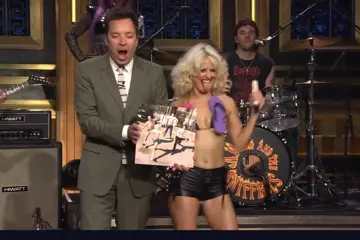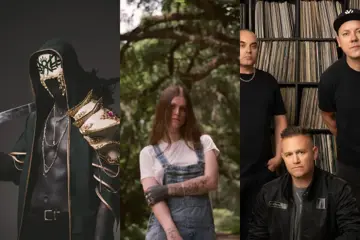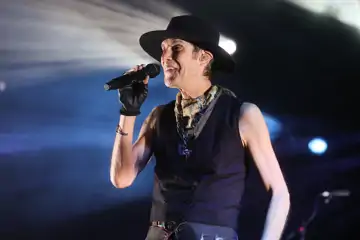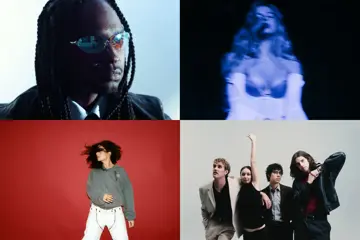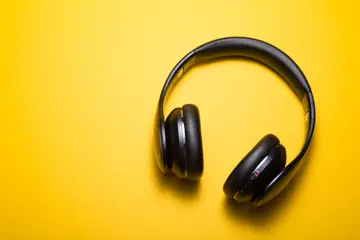If there was ever a Q&A to tune in to on the ABC, it was last night's. The special theme was The Power Of Music and there were NO POLITICIANS. That's right, the programme that has become more about finding a balance on every topic, and which in turn gives those that don't necessarily deserve it a voice, went full music and discussed a range of topics surrounding the industry right now.
The panel guests were all musicians and covered a wide range of genres. Jonathan Welch, Katie Noonan, L-FRESH The LION, Mojo Juju and Tex Perkins fronted a crowd of other musicians, educators, industry people and general music lovers.
After each panellist introduced themselves and we found out their inspiration for getting into the scene, we started to nut down on bigger issues with a question you could paraphrase as - ‘Why the hell isn’t more money spent on music education?’
Katie Noonan was given the opportunity to respond first and fired off some vital statistics around the industry and how important music and the arts are to Australia, not only in their less tangible benefits, but also in cold hard cash. The 2016-17 period shows that the creative industry contributed almost $112 billion to the Australian economy, which is 6.4 percent of our GDP, but the funding sits at around one percent. “There’s this huge disparity in what the arts gives back to our culture economically, but also the intangible ways”. She continued to say, “It’s been a pretty dire decade and actually the Federal Government now invests almost 20 percent less now per capita in each Australian person. That’s inexcusable.”
What needs to change in order to maximise the cultural and economic benefits of the music industry? #QandA pic.twitter.com/A0OIYSoMSj
— QandA (@QandA) September 30, 2019
Jonathan Welch latched onto the conversation as well, discussing what ‘the arts’ actually means and how the cultural cringe around the subject is starting to change, thanks to people speaking out. “I think that we’re very bad, in the arts, strangely enough, as singers and musicians, at speaking up about these issues.” Pointing to how active the sports industry is in increasing their funding, he argued that people in the industry need to start “banging on doors”.
The topic moved on to how music education in Australia could be improved, it being noted that funding and training within independent and private schools need to reflect why music is so important and that currently only two out of three public primary schools in the country have a music programme.
“Watch out, we’re coming from you”, closed an impassioned answer from the celebrated choral conductor.
.@Choir_man promises to lobby State and Federal government to make the case for music education. @MojoJujuMusic says the arts are often not taken seriously #QandA pic.twitter.com/QyA9A7fmpe
— QandA (@QandA) September 30, 2019
Tex Perkins was given a chance to answer a question on the differences between the days of record companies controlling the industry and today’s streaming platform models. True to form, Perkins didn’t hold back, stating, “The record business has always been corrupt. It’s always been exploitive of artists, right from the beginning.” He showed surprise at hearing that his collaborative track with Don Walker and Charlie Owen, Whenever It Snows, had reached a quarter of a million hits on Spotify (244,196 at the time of writing), and explained that he has received “nothing of significance” in terms of money for these plays. “We just want our music heard. Technology has kind of destroyed the industry, but also it’s made it easier for us to make music.”
L-FRESH The LION continued the topic, discussing how important it is for a musician to be multi-faceted to survive nowadays. “You can’t rely on the traditional record sale model and streaming.” This point was exemplified by the ways that artists, such as the ones of the panel, have diversified into education, promotion and other artistic paths to stay afloat and make a living.
Music therapy was brought up in a question that almost came out as a dig at 'the youngsters': “What will the current generation who listen to hip hop and rap, respond to when they age and lose their memory?”
Perkins declared, “I’ve been singing old people’s music since I was 17!” L-FRESH was given the chance to answer what he’d be wanting to hear when relaxing in a rocking chair in 40 years’ time. “For me, it’d be Tupac Shakur’s Changes. It’s such a meaningful song.” Mojo Juju added, “Hip hop was born in the late ‘70s, so there’s going to be people [fans] in nursing homes sooner than you think!”
Research shows that music can help restore memories for people living with dementia. Will hip hop music have the same effect as the current generation ages? #QandA pic.twitter.com/zycGrrO1gB
— QandA (@QandA) September 30, 2019
A little crowd interaction gave everyone, including the panellists, a chance to clap along to rhythms directed by Welch himself. “Can you imagine what’s going on in your brain? It’s all really feel-good stuff!”
From the crowd, Dave Roberts asked a question about the Sydney live music scene, stating that it is “frankly embarrassing”. On a day where another live venue had closed (The Valve Bar), it is a timely discussion point. Perkins raised the DIY method, “At some stage, you’ve gotta start doing it yourself. If Sydney is that barren, then hire a hall!” L-FRESH elaborated that places like Western Sydney are particularly sparse in terms of venues, especially considering how many burgeoning artists are coming from the region.
How can people inside and outside of the industry revitalize and reinvigorate the music and arts scene in Sydney? #QandA pic.twitter.com/1iz5bkRi6N
— QandA (@QandA) September 30, 2019
In the last question of the night, inclusivity was discussed, particularly in live music scenarios. Mojo Juju answered the question beautifully, bringing up the introduction of inclusivity riders. She explained, “I’m in the process of putting together an inclusivity rider that includes things like gender-neutral bathrooms, diversity amongst staff and security, a point person for LGBTQIA people, a point person for people of colour.” She also went on to say that musicians haven’t unionised to this point, but maybe these things are changing.
Ultimately, the hour barely scratched the surface of the many issues and topics surrounding the music industry, but it was a welcome change from the talking heads that usually take up the space on a Monday night.
What needs to happen to ensure live music venues are inclusive spaces, free of sexual harassment? #QandA pic.twitter.com/orzbrsLJ9t
— QandA (@QandA) September 30, 2019


